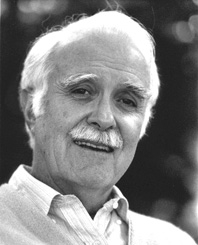John William Atkinson
John William Atkinson , also Jack Atkinson (born December 31, 1923 in Jersey City , New Jersey , † October 27, 2003 ) was an American psychologist who researched in the field of behavioral and motivational psychology.
Life
After completing school in New Jersey, Atkinson was accepted into the Air Forces in 1944 , where he was used as an instructor for the instrument flight of B-25 bombers during World War II .
After the war, Atkinson graduated from Wesleyan University with a master's degree in psychology in 1947 . His research was supported financially by the Office of Naval Research , and his doctorate took place in 1950 at the University of Michigan , where Atkinson remained active throughout his career.
Teaching
His scientific publications dealt mainly with questions of motivation and behavior. For achievement motivation (see achievement motive ) Atkinson's theory differentiates between an intrinsic ( for your own sake ) part and an extrinsic (interaction of hope for success and fear of failure) part.
According to Atkinson's risk choice model (1957), the “subjective probability of success” influences how one behaves when one has the opportunity to choose different levels of difficulty: Tasks that are too easy and too difficult cannot cause a feeling of satisfaction or disappointment, most people choose therefore tasks with a subjectively medium level of difficulty. Highly motivated people tend to behave according to this principle, they choose a realistic level of aspiration, while those with low motivation also choose tasks that are too easy or too difficult for them, i.e. tasks with an unrealistic level of aspiration.
In later writings (1964) Atkinson sees achievement motivation as a balance between approach and avoidance tendencies (an expectation-by-value model ). Whether one tackles an achievement or not depends on whether “hope for success” (subsequent feeling of pride ) or “fear of failure” (subsequent feeling of shame ) predominates. Three factors influence the tendency to strive for success: the success motive (a disposition), the intrinsic subjective probability of success (situation-dependent variable, see above) and the extrinsic success incentive (situation-dependent variable). By analogy, the tendency to avoid failure is explained from the failure motive, the subjective failure probability and the failure incentive.
Motivation = motive * incentive * probability of success
Awards
In 1975 Atkinson was elected to the American Academy of Arts and Sciences . In 1979 he received the Award for Distinguished Scientific Contributions , an award for outstanding scientific achievement from the American Psychological Association APA .
Works
- Motivational determinants of risk-taking behavior. In: Psychological Review. 64, 1957, pp. 359-372.
- with David Birch: The dynamics of action. Wiley, New York 1970, ISBN 0-471-03624-2 .
- with Joel O. Raynor: Motivation and achievement. Winston, Washington (DC) 1974, ISBN 0-470-03626-5 .
- An introduction to motivation Van Nostrand, New York 1964. German: Introduction to motivation research. Klett, Stuttgart 1975, ISBN 3-12-920210-2 .
- Personality, Motivation, and Action: Selected Papers. Greenwood Publ. 1983 (= Centennial Psychology Series), ISBN 0-275-90937-9 .
- with Julius Kuhl : Motivation, Thought, and Action. Praeger, New York 1986 (= Praeger special studies), ISBN 0-275-92096-8 .
swell
- ↑ [1]
- ^ Wesleyan Science Faculty: 1831-1961 Department of Psychology
- ^ A b c Walter Edelmann: Lernpsychologie. Psychologie Verlags Union, Weinheim 2000, 6th, completely revised. Ed., Pp. 252-258.
- ↑ APA: Winner of the Award for Distinguished Scientific Contributions on apa.org (English)
| personal data | |
|---|---|
| SURNAME | Atkinson, John William |
| ALTERNATIVE NAMES | Atkinson, Jack |
| BRIEF DESCRIPTION | American psychologist |
| DATE OF BIRTH | December 31, 1923 |
| PLACE OF BIRTH | Jersey City , New Jersey |
| DATE OF DEATH | October 27, 2003 |
